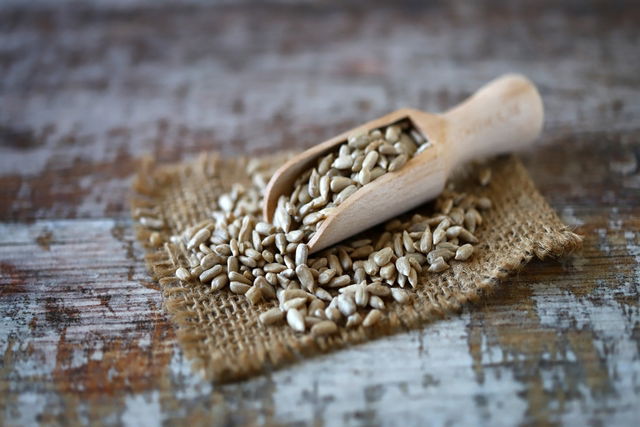Sunflower seeds are rich in healthy fats, proteins, fiber and antioxidants, which help fight constipation, prevent cardiovascular diseases (like high blood pressure or a heart attack), and also help with weight loss.
Ingesting just 30 g of sunflower seeds per day, the equivalent of a handful, is enough to obtain health benefits from this seed. They can be added to salads, fruit, yogurt, smoothies, juices or pasta.
Sunflower seeds are usually found in supermarkets or health food stores. The safest way to eat them is without their shell, either in their raw form or roasted, as it is not possible to chew the shell and digest it very well.
Another possible way to consume sunflower seeds is to ingest sunflower seed seed oil. It is is an excellent source of vitamin E, and helps to maintain the health of skin, nails and hair.


Health benefits
The main health benefits of sunflower seeds are:
1. Preventing cardiovascular disease
Because they are rich in mono and polyunsaturated fats, which are healthy fats, sunflower seeds can help to protect cardiovascular health. These fats can regulate total cholesterol levels, increase HDL cholesterol and decrease LDL and triglycerides.
Furthermore, its high content of micronutrients, antioxidant vitamins, folic acid and fiber enhance the cardiovascular protective effect. These nutrients protect the cells, and contribute to lowering blood pressure and regulating blood sugar.
2. Combating constipation
Due to their large amount of fiber, sunflower seeds help combat constipation. Fiber helps to reduce the time stool flows through the intestines, and also help to increase the volume of stool. Two tablespoons of sunflower seeds average 2.4 grams of fiber. Check-out other food for constipation you can incorporate into your diet.
3. Increasing muscle mass
Because it is a source of protein, sunflower seeds can easily help you to gain muscle. Two tablespoons contain 5 g of protein, which easily be included in your daily diet to increase your protein intake. Learn more about what to eat to gain muscle.
4. Managing high blood pressure
Sunflower seeds have a great amount of magnesium, which is an important mineral for optimizing the contraction and relaxation functions of arteries. This can promote good blood circulation and help to control high blood pressure. Learn more about other magnesium-rich foods you can include in your diet.
Sunflower seeds are also a good source of potassium, which is a mineral that helps to remove sodium from the body and eliminate it through urine. This can also directly contribute to the regulation of blood pressure.
5. Helping with weight loss
Sunflower seeds are often used in weight loss diets because they are rich in fiber, which increases the digestion time of meals. This means that sunflower seeds can prolong the time it takes for food to empty from the stomach, which can reduce hunger and keep your fuller for longer
Although it is a source of healthy fats, sunflower seeds are high in calories and should therefore be consumed in moderation.
6. Preventing early aging
Sunflower seeds are rich in vitamin E, which is a potent antioxidant that can help to delay premature aging and prevent wrinkles or sagging. Furthermore, the seed protects the skin from ultraviolet rays, preventing skin cancer and promoting nail and hair health.
7. Regulating blood sugar
Eating sunflower seeds regularly helps to slow the digestion and absorption of carbohydrates from meals. This can regulate the amount of sugar circulating in the blood, preventing hyperglycemia. Therefore, sunflower seeds can be a great addition to a diabetic diet.
8. Helping to reduce anxiety and insomnia
Sunflower seeds are rich in magnesium and tryptophan, nutrients that are important for the production of serotonin. This hormone is responsible for reducing stress, promoting well-being and relaxation. It contributes directly to a good night's sleep and to improving anxiety.
9. Promoting brain health
Sunflower seeds contain selenium, choline and vitamin E, which are components with antioxidant and anti-inflammatory properties. They can help to manage brain cell health, and prevent the development of diseases like Alzheimer's, Parkinson's, depression and dementia, as it can help to improve memory and other cognitive processes.
Nutritional information
The following table outlines the nutritional information in 100 g of sunflower seeds:
To obtain all the health benefits of sunflower seeds, it is important to incorporate them into a healthy, balanced diet.
How to eat
Sunflower seeds can be consumed in their natural form and added to salads, fruit, yogurt and granola, It can also be used as an ingredient in the preparation of cakes and other batters.
The recommended daily serving of sunflower seeds is 1/4 cup, which is equivalent to 30 grams. Excessive consumption of sunflower seeds can lead to weight gain, as they are naturally high in calories.
Healthy sunflower seed recipes
Some healthy recipes with sunflower seeds include:
1. Seasoned sunflower seeds
Seasoned sunflower seeds are a great option for their addition to salads, rice or on their own as a snack.
Ingredients:
- ⅓ cup (about 50 g) of shelled sunflower seeds
- 1 teaspoon of water
- ½ teaspoon of curry or turmeric
- 1 pinch of salt
- ½ teaspoon of olive oil
How to prepare:
Mix the sunflower seeds with the water, curry or turmeric and salt. Heat a frying pan over medium heat, add the olive oil and the previous seed mixture. Stir the seeds in the oil for about 3 to 4 minutes, until they are toasted. Remove from heat, wait for them to cool and serve. To store these sunflower seeds, be sure to let them cool completely and then pour into an airtight container. Consumet within 15 days.
2. Sunflower seed paste
Ingredients:
- 2 cups of shelled sunflower seeds
- v cup of lemon juice
- ½ cup of tahini
- ½ cup of water
- ¼ onion of onion, chopped
- 1 clove of garlic
- ¼ tablespoon of chives, chopped
- ¼ tablespoon of parsley, ¼
- 1 tablespoon of chia seeds
- 1 tablespoon of extra virgin olive oil
How to prepare:
Soak the sunflower seeds in water for 4 hours. Then drain the seeds and mix in a blender with the other ingredients (except the chia seeds and olive oil) until it reaches a paste consistency. Finally, mix in the olive oil and chia seeds with a spoon and serve with toast or whole grain bread, or as a dressing for salads.
3. Granola with sunflower seeds
Ingredients
- 300 g of oats
- 1/2 cup of shelled sunflower seeds
- 1/2 cup of whole almonds or hazelnuts, raw
- 1/2 cup of shelled pumpkin seeds
- 1/4 cup of seasame seeds
- 1/4 cup of coconut strips
- 1/4 teaspoon of cinnamon powder
- 1/4 teaspoon of salt
- 1/4 cup of water
- 1/4 cup of sunflower oil
- 1/2 cup of honey
- 2 tablespoons of brown sugar
- 1 cup of dried fruit (dried figs, raisons, dates, etc.)
How to prepare
Preheat the oven to 135ºC (or 275ºF). Line a baking tray with baking paper. Mix the oats, almonds, seeds, cinnamon and salt in a large bowl. In a small pan, mix the water, oil, honey and brown sugar and place over medium heat, stirring constantly until it boils.
Pour the heated mixture over the dried ingredients and mix well. Then spread over a baking pan and bake in the over for about 60 minutes, or until it becomes golden. Be sure to mix throughout the baking process for it to become evenly golden. The more golden it is, the crunchier the granola will become.
Once cooled off, you can store it in a tupperweare or plastic bag at room temperature or in the fridge.
